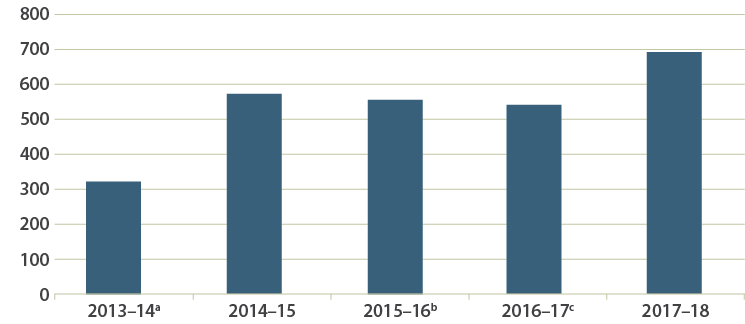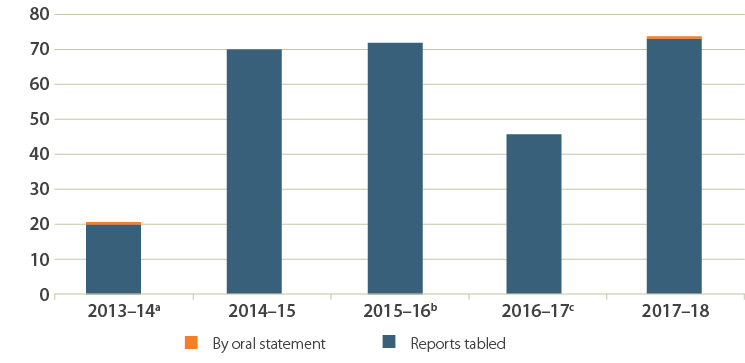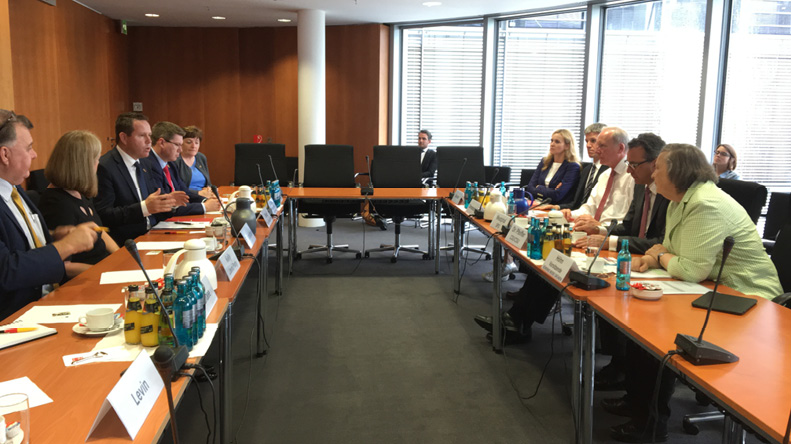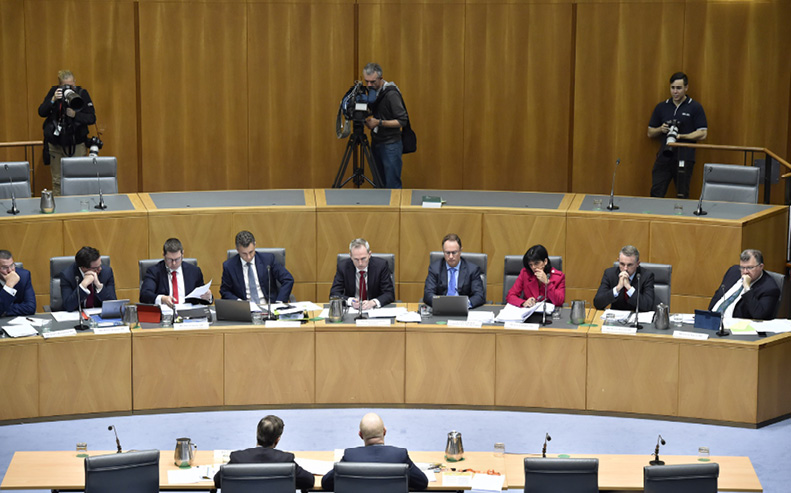The Committee Office supports parliamentary committees in their work of examining policy and legislation, and of scrutinising the executive government. In 2017–18, the Committee Office comprised 10 secretariats that supported 14 House committees and 11 joint committees (see Table 7).
Expenditure on these services in 2017–18 was $8.652 million, which was $0.826 million below the budget allocation of $9.478 million. Results against performance criteria are summarised in the annual performance statement (page 20); staff levels are shown in Table 12.
Table 7: Committees of the Forty-fifth Parliament supported by the Committee Office
|
House committees
|
Joint committees |
|
Standing Committee on Agriculture and Water Resources
|
Joint Committee of Public Accounts and Audita
|
|
Standing Committee on Communications and the Arts
|
Joint Standing Committee on Electoral Matters
|
|
Standing Committee on Economics
|
Joint Standing Committee on Foreign Affairs, Defence and Trade
|
|
Standing Committee on the Environment and Energy
|
Joint Standing Committee on Migration
|
|
Standing Committee on Employment, Education and Training
|
Joint Standing Committee on the National Capital and External Territories
|
|
Standing Committee on Health, Aged Care and Sport
|
Joint Standing Committee on Northern Australia
|
|
Standing Committee on Indigenous Affairs
|
Joint Standing Committee on Trade and Investment Growth
|
|
Standing Committee on Industry, Innovation, Science and Resources
|
Joint Standing Committee on Treaties
|
|
Standing Committee on Infrastructure, Transport and Cities
|
Parliamentary Joint Committee on Intelligence and Securitya
|
|
Standing Committee on Petitions
|
Parliamentary Standing Committee on Public Worksa
|
|
Standing Committee on Social Policy and Legal Affairs
|
Joint Select Committee on Constitutional Recognition Relating to Aboriginal and Torres Strait Islander Peoples 2018
(19 March 2018–ongoing)
|
|
Standing Committee on Tax and Revenue
|
|
Select Committee on Regional Development and Decentralisation (1 June 2017–28 June 2018)
|
|
Select Committee on Intergenerational Welfare Dependence (24 May 2018–ongoing)
|
- Joint statutory committee.
Note: Five House internal committees (Appropriations and Administration, Procedure, Publications, Selection, and Privilege and Members' Interests) and the Joint Committee on the Broadcasting of Parliamentary Proceedings and Joint Committee on Publications are supported by other areas of the department, and are discussed on pages 37–39.
Committee Office activity
In 2017–18, the Committee Office’s support for the diverse work of committees involved:
- facilitating committees’ private meetings, public hearings and site inspections
- providing procedural and inquiry-related advice to committees and stakeholders
- fielding inquiries from interested stakeholders about the purpose and progress of inquiries
- promoting committee inquiries and reports
- conducting research and analysing evidence received by committees
- drafting chairs’ reports
- facilitating the adoption and tabling of committee reports.
Overview
During the year, the Committee Office experienced a consistently high workload, with high numbers of inquiries, meetings and reports tabled. In this period, several committees undertook simultaneous inquiries, which resulted in a heavy workload. In addition, the department supported two House select committees and one joint select committee. Despite this heavy workload, the Committee Office was successfully able to support all committees within its remit. This was evidenced in the tabling speeches of many members in the Chamber, in which the contributions and professionalism of committee staff were acknowledged. The Committee Office has received positive informal feedback throughout the year from members satisfied with the level of support provided by the Committee Office.
As in each reporting period, committees inquired into and reported on a diverse range of topics, including a review into Australia’s major banks, Australia’s electricity grid, modern slavery, the impact of section 44 of the Constitution on Australian democracy, and educational opportunities for Indigenous students. Appendix 3 lists all reports tabled over 2017–18 and current inquiries.
The sustained workload of committees is evidenced in Figures 5 and 6, which highlight the number of committee meetings and reports tabled in the year.
The committees supported by the Committee Office held 693 meetings in 2017–18. Appendix 2 provides a breakdown of that activity by committee. Figure 5 shows the number of meetings held by committees over the past five years.
Figure 5: Number of committee meetings supported by the Committee Office, 2013–14 to 2017–18

- The Forty-fourth Parliament opened on 12 November 2013.
- The Forty-fourth Parliament ended with the dissolution of both Houses on 9 May 2016.
- The Forty-fifth Parliament opened on 30 August 2016.
The Committee Office tabled 73 reports in 2017–18. Appendix 3 provides a breakdown of that activity by committee. Figure 6 shows the number of reports tabled by committees over the past five years.
Figure 6: Number of reports tabled by committees, 2013–14 to 2017–18

- The Forty-fourth Parliament opened on 12 November 2013.
- The Forty-fourth Parliament ended with the dissolution of both Houses on 9 May 2016.
- The Forty-fifth Parliament opened on 30 August 2016.
Government responses to committee reports
The government is required by resolution of the House to respond to recommendations contained in a report by a House or joint committee within six months of the report’s tabling. This resolution was adopted by the House on 29 September 2010.
During 2017–18, 42 of the 84 tabled reports contained recommendations that required a government response. Government responses to seven reports were received within the six-month timeframe; two reports received partial government responses in the required timeframe and the other 33 reports are awaiting responses.
Information and communications technology
The Committee Office continued to rely on its use of information and communications technology (ICT) to increase the efficiency of work and to provide greater access for stakeholders interested in engaging with committees. The videoconferencing room in 1R3 at Parliament House was used regularly for committee work, allowing committee members to conveniently hold public hearings with stakeholders from around Australia. Members have provided positive feedback to committee staff about this flexible service because it allows public hearings to be held with interstate organisations during busy sitting weeks. Members also noted the savings and efficiencies in time and travel costs.
Shared Committee Information Database and Report Builder
The Committee Office continued to collaborate with the Department of the Senate and DPS on the Shared Committee Information Database (SCID), an important data management and publishing tool for the office. Report Builder, a template for drafting committee reports, is closely integrated with SCID. Through SCID, Report Builder links committee and inquiry information, and enables web publishing of reports in PDF, HTML and e-book formats.
A number of Report Builder defects have been resolved throughout 2017–18, and the template now provides the Committee Office with a functional drafting and publishing tool. Other defects are expected to be resolved in the ongoing year.
Facilitating international visits
The Committee Office facilitated several overseas visits that related to particular inquiries. The Joint Standing Committee on Migration visited Germany, Sweden, the United Kingdom and the United States between 2 and 16 July 2017 to investigate matters relevant to the committee’s inquiry into migrant settlement outcomes. In each location the committee met with a range of individuals and organisations to gain a better idea of international experience in the areas of violent extremism and terrorism, gangs and criminality, and migration and settlement.
Highlights from the trip included meeting with police organisations in Sweden and the United Kingdom. The delegation members were impressed with the District Mothers Program in Germany, where migrant women are trained and employed to assist migrant families with integration, education and employment.
In the United States, the committee received a briefing from the Federal Bureau of Investigation on anti-gang initiatives and the work of gang taskforces, including the Mara Salvatrucha (MS-13) taskforce and 18th Street taskforce. They also met with Homies Unidos, which provides youth life skills and parenting programs for target families and youth either at risk of involvement or already involved with gangs.
The Standing Committee on Health, Aged Care and Sport conducted, and reported on, its inquiry into the use and marketing of electronic cigarettes (e-cigarettes), which attracted considerable public attention within Australia and also internationally. The inquiry received a total of 352 submissions, 1,704 signatories to three form letters, and 45 exhibits. The committee subsequently held three roundtable public hearings nationally, and three briefings with various groups and individuals from the United Kingdom. Members of the committee also travelled to New Zealand to learn about the process that country is taking to legalise e-cigarettes. The inquiry entered into an already populated arena of reports on the matter, which looked at e-cigarettes from health, consumer and regulatory perspectives. The committee recommended maintaining the status quo, which was non-legalisation of e-cigarettes, with a focus on conducting research into the future.
In July, four members of the Standing Committee on the Environment and Energy travelled to Germany and the United States as part of the committee’s inquiry into modernising Australia’s electricity grid. The visit sought to gather insights from jurisdictions with varying approaches to energy policy, and at different stages of the grid modernisation process. The visit program—which was prepared by the secretariat, and facilitated by the International and Parliamentary Relations Office and relevant Australian diplomatic posts—enabled members to meet with fellow parliamentarians, government bodies, regulators, academics, non-government organisations and the private sector. The outcomes from the visit, and the intensive time spent together by members, made a strong contribution to the committee being able to deliver a bipartisan report in what was a contentious area of public policy.

Delegation from the Standing Committee on the Environment and Energy in Germany meeting with counterparts from the Bundestag Committee on Economic Affairs and Energy. Image: secretariat.
Outlook
The Committee Office is currently supporting many ongoing inquiries and it is expected that this high level of committee activity will continue throughout 2018–19.
In the coming year, members of parliament will continue to be professionally supported by the Committee Office. Continuing to invest in our staff—in important areas such as procedural knowledge and leadership skills—will remain a key priority.

Public hearing of the Standing Committee on Economics. Image: Michael Masters, Auspic/DPS.